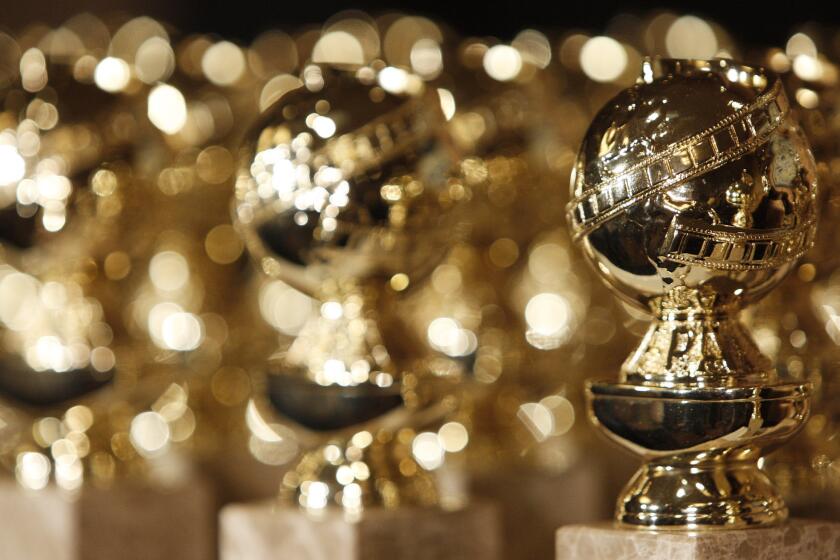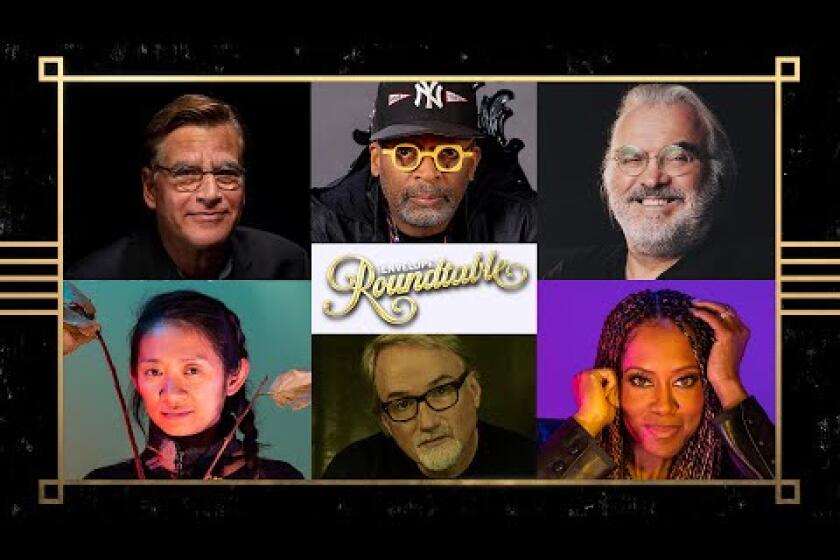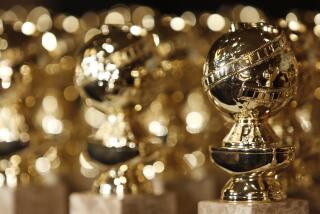Column: The Golden Globes nominating female directors should not be news — but it’s a start

It’s no secret that pretty much everyone who writes about Hollywood thinks the Golden Globes are a joke — who cares what cinematic work the tiny and famously schnorring Hollywood Foreign Press Assn. thinks is best?
And every year, the joke is absolutely on us, particularly the portion of “us” who live in the actual environs of Hollywood and therefore must drag ourselves out of bed for the predawn nominations announcement.
This year at least we didn’t have to include time for a commute (or changing out of pajamas). And this year, there was at least one thing that made it worth hanging out with the sunrise.
Three things, actually: Emerald Fennell, Regina King and Chloé Zhao.
Yes, folks, this year and this year alone, there are more women than men in the Globes’ directing category.
Previously, the HFPA, in all of its 76-year old history, nominated female directors only seven times (Kathryn Bigelow and Barbra Streisand have each been nominated twice and only Streisand has won, for “Yentl”). To be fair, it has a better record than the Oscars, which, over the course of 92 years, has nominated only five women for directing (Bigelow remains the sole winner, for “The Hurt Locker”).
With Wednesday’s announcement of the nominees for the 78th Golden Globes, the Hollywood Foreign Press Assn. marked the start of an awards season like no other.
Now, in a single year, the Globes has increased its female director nominee count by more than 40% — to a whopping 10. (Fun fact: Steven Spielberg has 12 Globe nominations, which means one man has received more director nominations than all the female directors combined, in case you are wondering why women are still screaming.)
Two of this year’s female directors — Fennell and Zhao — also got nods for their screenplays, and Fennell’s “Promising Young Woman” and Zhao’s “Nomadland” were nominated in the best picture — drama category (“Promising Young Woman” was entered as a comedy, but never mind, HFPA knows best.)
King’s “One Night in Miami,” based on the historic meeting of legends Jim Brown, Malcolm X, Sam Cooke and Cassius Clay, was missing from the screenplay and drama categories, possibly because the HFPA decided “Promising Young Woman” wasn’t a comedy (despite its creator having written it as a comedy, but what does she know?) and possibly because ensemble dramas, at least those featuring Black performers (see also “Ma Rainey’s Black Bottom” and “Judas and the Black Messiah”), just weren’t the HFPA’s thing this year.
Critically acclaimed Eliza Hittman and her “Never Rarely Sometimes Always” and Kelly Reichardt and “First Cow” also were missing from all categories but — bright side — Zhao is the first Asian American female director ever to be nominated in the history of anything.
And King has already won every cinematic acting award possible, so it will be fun watching her win for directing, if not this year then at some point in the future, because the woman is a national treasure.
For women, it is a big improvement on last year when, despite many fine films written by, directed by and about women, the nominated female directors and screenwriters numbered exactly zero and almost every nomination in the best drama and comedy categories centered on men — Scarlett Johansson (“Marriage Story”) and Ana de Armas (“Knives Out”) were the only female actors nominated for their work in films that also were nominated in the top categories.
When six directors — David Fincher, Paul Greengrass, Regina King, Spike Lee, Aaron Sorkin and Chloé Zhao — recently got together to talk about their latest projects, they shared candid feelings about control on-set and the movie business in a post-COVID world.
This year’s list is most certainly an answer to last year’s outrage — at both the Globes and the industry. Just as #OscarsSoWhite finally forced Hollywood to make, and honor, a more racially diverse slate of films, the growing furor over the exclusion of female-led and female-centric movies led to 2020 being heralded as the year of the woman.
An unheard-of number of women (which is to say more than one) directed tentpoles, including “Black Widow,” “Birds of Prey“ “Mulan,” “Wonder Woman” and Zhao’s own “The Eternals,” that were scheduled to be released in 2020 amid a slate that included more female-led films than Hollywood has seen since its historic golden years.
Of course, the pandemic derailed some of these projects, in ways large (pushed-back theatrical release dates) and small (the long-controversial VOD and streaming debuts). But no matter the timing, the platform or even the success of each project, the films exist. And nominated or not, they are being, or eventually will be, enjoyed by millions as women, slowly but surely, take their rightful place in cinematic storytelling.
So even though the HFPA predictably lost its mind over “Mank” (“Citizen Kane” still reigns supreme!) and in TV managed to snub not only the mind-blowing “I May Destroy You” and its powerhouse creator-star Michaela Coel but also the miraculous trinity of Meryl Streep, Candice Bergen and Dianne freaking Wiest in “Let Them All Talk,” seeing three female names in the directing category was definitely worth rising with the dawn.
Which is sad, in a way. Nominating female directors should not be news — but it’s a start.
More to Read
Only good movies
Get the Indie Focus newsletter, Mark Olsen's weekly guide to the world of cinema.
You may occasionally receive promotional content from the Los Angeles Times.













